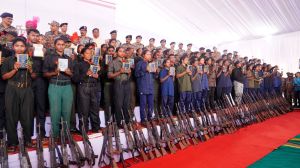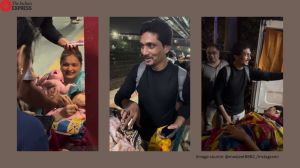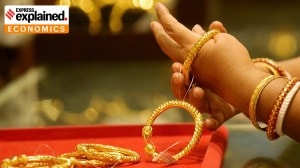A generation of half-Arab children await their fathers
KOZHIKODE, AUGUST 15: Their Arab honeymoon is over. For hundreds of poor Muslim women in Kozhikode, most of whom are still in their thirti...

KOZHIKODE, AUGUST 15: Their Arab honeymoon is over. For hundreds of poor Muslim women in Kozhikode, most of whom are still in their thirties, the only lasting gain from their brief marriages to ageing Arabs are the offspring.
There are hundreds of distinctly Arab-looking boys and girls — whose fathers live in memory or a rare fading photograph or an old letter — in the slum-like hovels of Kozhikode. These are places the visiting Arabs favoured for seasonal sex and companionship for many decades. Despite the apparent hopelessness, many cling to the belief that their fathers would return one day from across the seas, with a visa to prosperity.
In Kerala, Arab marriages have been an almost exclusive Kozhikode practice. Even centuries ago, Arab merchants used to find wives here when they had to stay for long intervals.
Things began degenerating in the last few decades, in which Kerala witnessed a Gulf boom and increased interaction with the Arab countries. More than the rich dhow-owning Arab businessmen lugging off timber and spices from these coasts, every deck-hand, khalasi and menial worker in Arab gear began finding young girls here, mostly for a month or so, before their ship would weigh anchor for yet another port of call. Then came the other visiting Arabs lured by the tales, flying in for cheap but legitimate sex.
The girls, invariably in their teens, were available aplenty thanks to the huge dowry and other demands on their parents from local grooms. Besides, the imagined mystique of Arabian riches were hard to resist.
“A broker got my mother Khadeeja to marry Ummer Darvesh Marzook Ibrahim, a Yemeni sailor. He used to see her for a few weeks every three to four years, and had four kids, including me. The last time he came was nine years ago, before my youngest sister was born. My mother kept waiting, and finally lost her senses. She burnt his picture and even the address. I now don’t know where he may be, or even if he is alive,” says 22-year-old Salim Ibrahim, a labourer in the Big Bazar.
Thirty-one-year-old Suhara Ali of Pallikandi has a double Arab connection. Brokers got Syed Hussain Ali, an old UAE Arab who stepped off a ship in Beypore 31 years ago, to marry her mother Bichami. She remembers her Arab father making an occasional appearence over the years, till he died a decade ago. At age 15, brokers came to marry away Suhara with her clear Bedouin features, to a 47-year-old Arab-Iranian sailor Abbas Muhammed Nijat, who said his two earlier marriages back home were barren.
Nijat stayed with her for a few weeks, and left her pregnant. He returned when the baby girl was 2 years old, and asked Suhara to take the baby and go with him to Iran. At the Mumbai airport, Nijat told the girl and her accompanying brother that there was some problem with the papers. He took the baby, promising to be back in three weeks’ time to take Suhara. That was the last she saw of him.
“My daughter, Nargis, will be 17 now. Please help me see her, just once again,” Suhara pleaded.
Not very different is the case of Subaida Kammu, who married a visiting Arab, Sala Ahmed Hassan, 24 years ago. Initialy, he used to come every few years and stay for a month or two, giving her two young daughters, Noorjahan and Usila. “His occasional letters stopped, and he never came again after 1985. He had not even seen his second daughter,” Subaida said.
Thirty-seven-year old Fathibi married Arab trader and cleric Ahmed Abait Mufti 22 years ago, for a princely mehar of Rs 2,000. He used to come and stay with her for a few days every four or five years, and gave her two boys. “The last I heard from him was 10 years ago, when he sent Rs 900 from somewhere, with a letter that some Malayali wrote for him. Some say he may be dead.”
That was not all. “I came to know that he had married another young girl in my own neighbourhood and had a child in her, while I was pregnant with my second son. But she too had not heard from him since,” Fathibi said.
There are hundreds of other women with similar tales, all along those pockets looking out into the sea. Many had been forced into prostitution for sheer survival. Hopes died long ago.






- 01
- 02
- 03
- 04
- 05

























